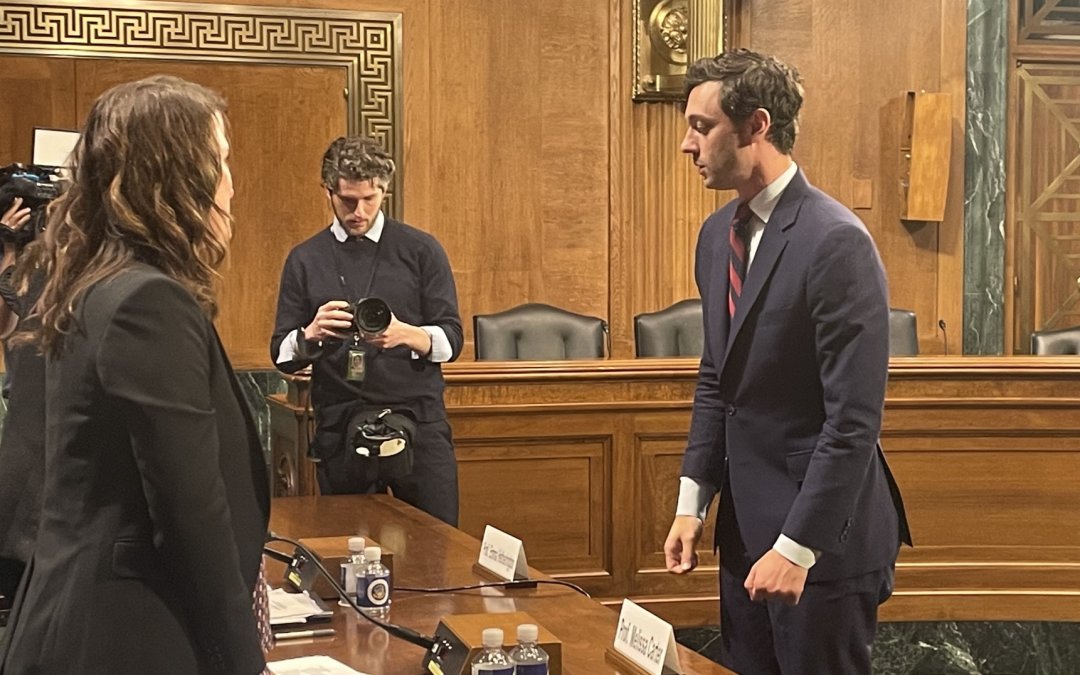WASHINGTON – A Senate bipartisan inquiry into the failures of the foster care system heard first-hand accounts of the neglect and abuse, with experts providing lawmakers with recommendations for changes on Oct. 25.
The inquiry came on the heels of an independent investigation into widespread neglect and child abuse in Georgia’s foster care system, which oversees about 11,000 children. In February, Sen. Jon Ossoff (D-Ga.) and Sen. Marsha Blackburn (R-Tenn.) sent a letter to Georgia’s Department of Human Services, demanding answers. As chairman of the Senate Human Rights Subcommittee, Ossoff convened the first hearing on Wednesday on the treatment of children in the foster care system.
“Ultimately, this is not about statistics and bureaucracies,” Ossoff told reporters. “It’s about human beings. It’s about the most vulnerable human being in our state — foster children.”
Rachel Aldridge, a parent from Georgia, testified about the murder of her two-year-old daughter Brooklynn, whose case was managed by the state’s Division of Family & Children Services.
In July 2022, Georgia Office of the Child Advocate, an independent oversight group, found that caseworkers were “no longer adequately responding to child abuse cases.”
Aldridge had uncontested custody of her daughter. But she told lawmakers that after she was wrongfully arrested, DFCS placed the child with Brooklynn’s father, who was not a certified foster parent. His live-in girlfriend would later be convicted of killing Brooklynn.
Leading up to the murder, Aldridge reported to caseworkers at DFCS warning signs, like a bruise on Brooklynn’s leg and drug use in the home. Still, the agency did not remove the child, Aldridge recalled tearfully.
“Brooklynn would still be alive if anyone at DFCS had just been willing to listen to me — her own mother,” Aldridge said. “The system meant to protect children failed Brooklynn at every level.”
Ossoff, a father himself, told Aldridge that she had gone through “every parent’s absolute worst nightmare.”
According to an audit, DFCS failed 84 percent of the time when it came to risk assessment and safety management. Aldridge’s story illustrates that failure, said Melissa Carter, an attorney specializing in child law.
“Safety assessment is both an art and a technique,” Carter said. “Once the child is placed there, there’s this ongoing responsibility to check in, to just make contact with that child.”
Georgia DFCS receives upward of 120,000 reports of suspected child mistreatment annually. Many case managers lack the resources to solve problems that are presented to them, Carter said.
Carter added that Georgia has not invested enough in preventative measures to avoid forcing children into the child welfare system. The state has not used federal funds efficiently either, she said.
“This is about systemic failures,” Carter said. “Georgia lacks the operational capacity, policy, infrastructure and practice tools to support effective case management.”
OCA, the independent oversight body, also determined DFCS provided “inadequate” services for children who underwent human trafficking, sexual abuse and physical abuse. Foster children, especially Black, brown and LGBTQ+ youth, are “treated more like adults,” Emma Hetherington, a lawyer who works with survivors of child sexual abuse, told the Senate panel.
In DFCS documents and communications, the agency used phrases, like “promiscuous,” “sex addict” and “prostitute,” to describe youth in their care.
“Let me make it clear: There is no such thing as a child prostitute,” Hetherington said. “The foster care system in Georgia has always struggled with systemic challenges and barriers, but I’ve never seen it this dismal as it is today.”
In the past year, Georgia has spent $28 million to house foster children in hotels because DFCS could not find a home for them. The state came under fire for this practice, called “hoteling,” as some say it deprives youth of a stable environment and treatment.
When Mon’a Houston, a former foster child from Georgia, was in DFCS’ care, she cycled through 18 placements, including group homes and hotels, she testified.
Houston emphasized the need for good case managers. Of three case managers who were assigned to her from 2017 to 2022, only one visited her and answered her phone calls, she said.
“I felt alone,” Houston said. “I’m doing this, so other people know they can come out on the other side.”
Blackburn presented a hypothetical to Houston, asking her to rewrite the job description of a caseworker.
“Listen to the children,” Houston said. “Make them feel loved. Make them feel like they have a family.”
Ossoff emphasized that the Senate’s investigation is “ongoing.” Once the inquiry period ends, Ossoff expects lawmakers will have necessary information to draft legislation.
“We have an obligation to understand why and how (foster children) are being harmed, abused, neglected — and to change that system,” Ossoff said. “Reform is absolutely the ultimate goal.”

